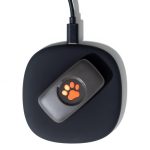Table of Contents

Disclaimer: I am not a vet, but an enthusiastic pet owner with a diverse knowledge of dogs, cats and other pets. Writing well researched articles recommending dog friendly products to in-depth guides. Please seek a certified vet for a professional opinion on your dog, these articles are written from my own research and opinions. Please read our Terms and Conditions for more! As an Amazon associate I earn from qualifying purchases.
Electric dog collars, also known as remote training collars, are devices used for training and controlling dogs. They usually come in the form of a collar with an embedded receiver and a handheld remote control. The collar receiver is equipped with electrodes or contact points that make contact with the dog’s neck.
The most controversial aspect of these collars is the static shock feature, which delivers a mild electric shock to the dog’s neck when triggered by the remote control.
It’s this very feature which has been widely discuss in the UK for many years. Experts and dog trainers have advised against using electric collars for a number of reasons.
In this article we’ll dive deeper into shock collars, if they are allowed and some good alternatives which don’t harm your pet.
What is the idea behind electric collars?
The idea behind electric collars is to provide immediate feedback or correction to a dog’s behavior. The remote control allows the trainer or owner to deliver an electric shock to reinforce desired behaviors and to prevent excessive barking or aggression.
For example, if a dog is barking excessively, the remote control can be used to deliver a static shock to discourage the barking or bad behaviour.
Some trainers and dog owners believe that these collars can be an effective tool when used correctly and responsibly, while others argue that they can cause unnecessary stress, fear, or even physical harm to dogs.
Can shock collars harm your dog?
Yes, shock collars have the potential to harm your dog both physically and psychologically. These collars are designed to deliver an electric shock to your dog’s neck when activated. While they are marketed as training tools, there are several concerns associated with their use.
Physically, shock collars can cause pain, burns, and other physical injuries to your dog’s neck area. The intensity of the shock can vary depending on the settings, and even at lower levels, it can still be distressing and uncomfortable for your dog.
Psychologically, shock collars can have negative effects on your dog’s emotional well-being and behavior. They can cause fear, anxiety, and stress, which may lead to behavioral issues such as aggression or avoidance. The association of pain or discomfort with certain behaviors or environments can also result in generalised anxiety in your dog.
Are shock collars allowed in the UK?
No, as of the 1st of February 2024, remote control shock collars capable of shocking dogs for 11 seconds up to 2 miles will be banned.
The Kennel Club who led the campaign for over 10 endured a ‘historic moment for animal welfare’ after the UK government changed the legislation.
As of 2023, around 5% of UK dog owners are using some form of shock-able collars. The Kennel Club estimate that over 500,000 dogs will be saved from these harmful electric devices.
Many of the shock collars were being used by breeders in an attempt to change the behaviour of their dogs. But the electric shocks delivered by these shock collars can cause physical pain, discomfort, and distress to dogs. The intensity of the shocks can vary, but even low-level shocks can be frightening for the animal. This can lead to anxiety, fear, and a breakdown of trust between the dog and its owner.
Do shock collar alternatives exist?
Thankfully, alternatives to shock collars do exist. Vibration or “anti bark” collars are a great way to train your dog without using force or harming your canine.
These collars won’t set you back much and cost within the region of £15-£25.
How do anti bark vibration collars work?
Anti-bark or vibration collars are designed to discourage dogs from excessive barking by delivering a stimulus in response to the barking behavior. These collars typically work in one of two ways: through vibration or through a combination of vibration and sound. Most do not use electric shocks, and it’s best to stay away from those which do.
The video below shows what non-lethal collars can do to a dogs behaviour. I think it’s really interesting how the dog behaves.
The vibration and sounds serves as a distraction to interrupt the barking behavior, as it surprises the dog and diverts its attention away from barking. The goal is to condition the dog to associate barking with the vibration or sound, discouraging them from excessive vocalisation over time.
Whilst vibration and sound collars are the safest and most humane teaching collars, it’s best to check with your vet on their opinion. They know what’s best for your dog!
What are the best anti bark collars?
Anti bark devices and collars are a good alternative to hurting your dog physically and mentally with electric shocks.
If you’re dog is prone to barking or aggressive behaviour anti bark vibration collars are a good way to start. According to ipetguides, vibration anti bark collars will not harm your dog, the noise and vibration is designed to startle and confuse your dog resulting to relaxed behaviour.
Here are some of the better anti bark collars (around £20) which do not shock with electricity:
- DogRook dog collar – 2 vibration modes and 7 sound stages. Highly effective, water proof and pain free. Designed for all breeds whether small, medium or large.
- Cathal Kelly Anti Barking Collar – Rechargeable, waterproof and 5 sensitivity settings. 7-15 day battery life, suitable for all sizes of dog.
- Masbrill UK dog collar – Harmless training collar with 7 different sensitivity levels. Rechargeable, rain proof and uses vibrations to correct barking.
Related: 10 Dog Breeds That Make Great Family Pets (UK Edition)
FAQ
Q: What is an anti bark collar?
Anti bark collars, like the DogRook Rechargeable are small devices try to diminish aggressive dog behaviour and loud barks. Anti bark collars work by combining vibrations, sounds or spray smells to deter your dog from barking. Collars like DogRook do not shock your dog but deliver a discomforting sound to correct or minimise your dogs barking.
Q: How to get my dog to stop barking?
Excessive barking can be a very common issue with dogs. We’ve all gone through it before. But barking can become disruptive, especially for neighbours. Here are some ways I’ve used to get my dog to calm down:
- Providing mental stimulation – Regular exercise and interactive toys
- Ignoring attention seeking – Don’t engage with your dog when they bark for your attention
- Socialise – Socialise your dog with other dogs or groups
- Use commands – Train commands like “enough” or “quiet”
Q: Do shock collars work?
Several studies have reported the behavioural effects of shock collars. Scientists suggest that shock collars can cause extreme stress to dogs which can lead to long term behavioural changes and depression. Direct reactions towards the shocks revealed dogs change in posture, high pitch yelps, avoidance and redirected aggression.
Not only are shock collars bad for dogs, they can cause dramatic behavioural changes which can last long term. Seek alternatives!
Q: Are shock collars legal in the UK?
No, as of the 1st February 2024, the UK government have banned shock collars which can be activated by a remote.
Q: Are shock collars a good idea?
Shock collars can create fear and aggression in your dog and negatively change their behaviour. Whilst they may help short term, long term they may psychologically damage your dog and should not be used!












3 thoughts on “Why Are Electric Shock Collars Banned In The UK?”
Comments are closed.